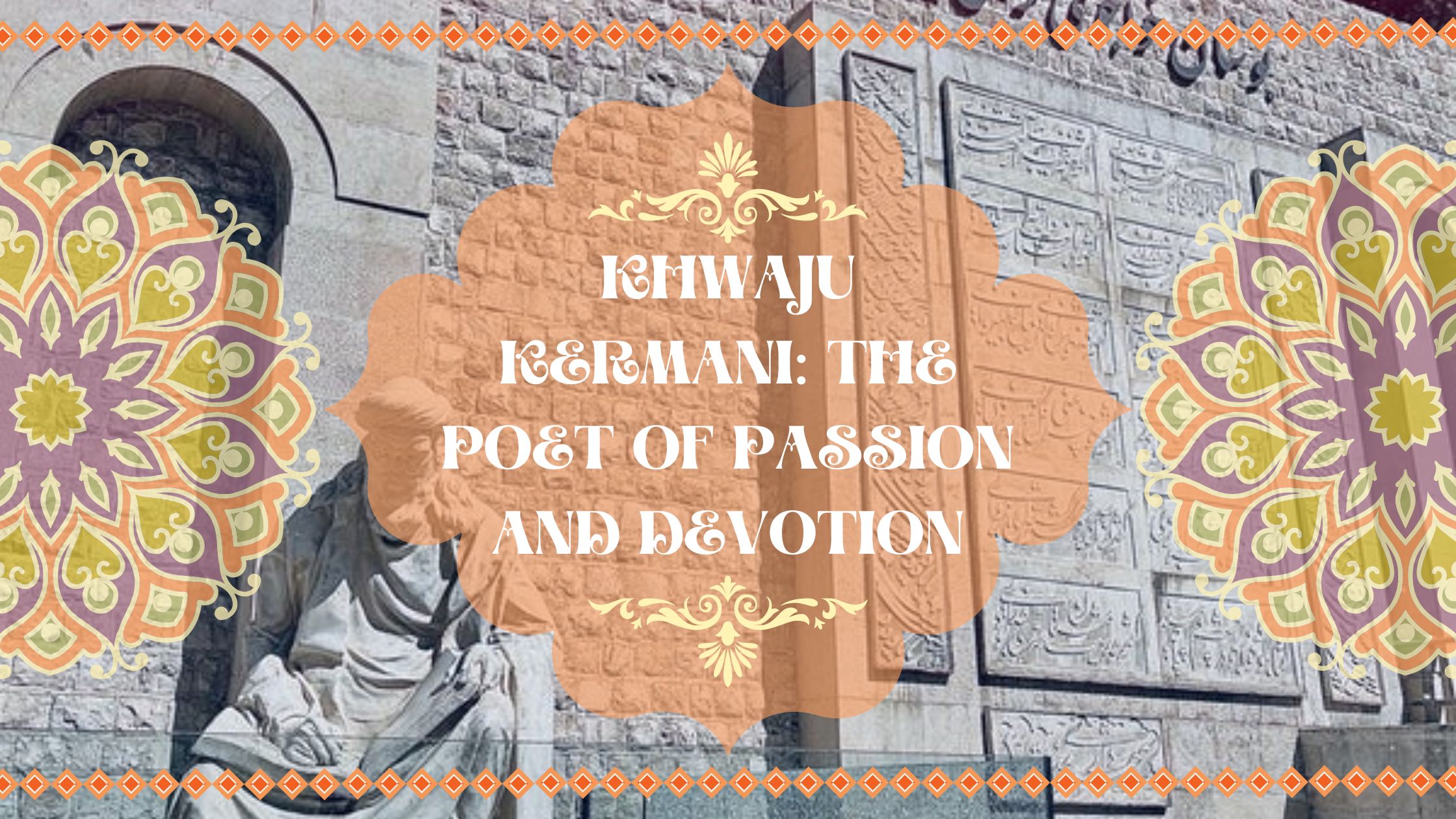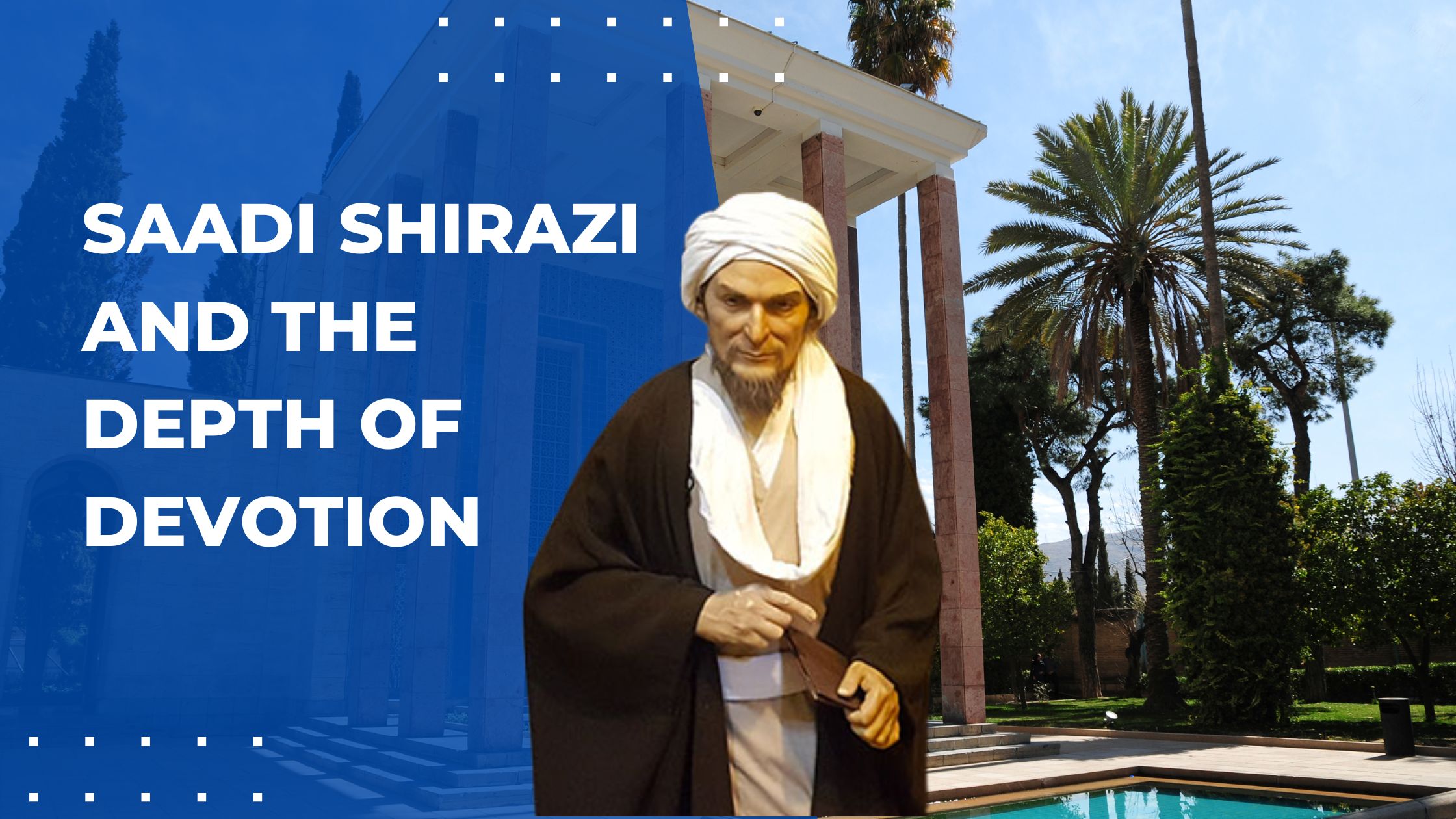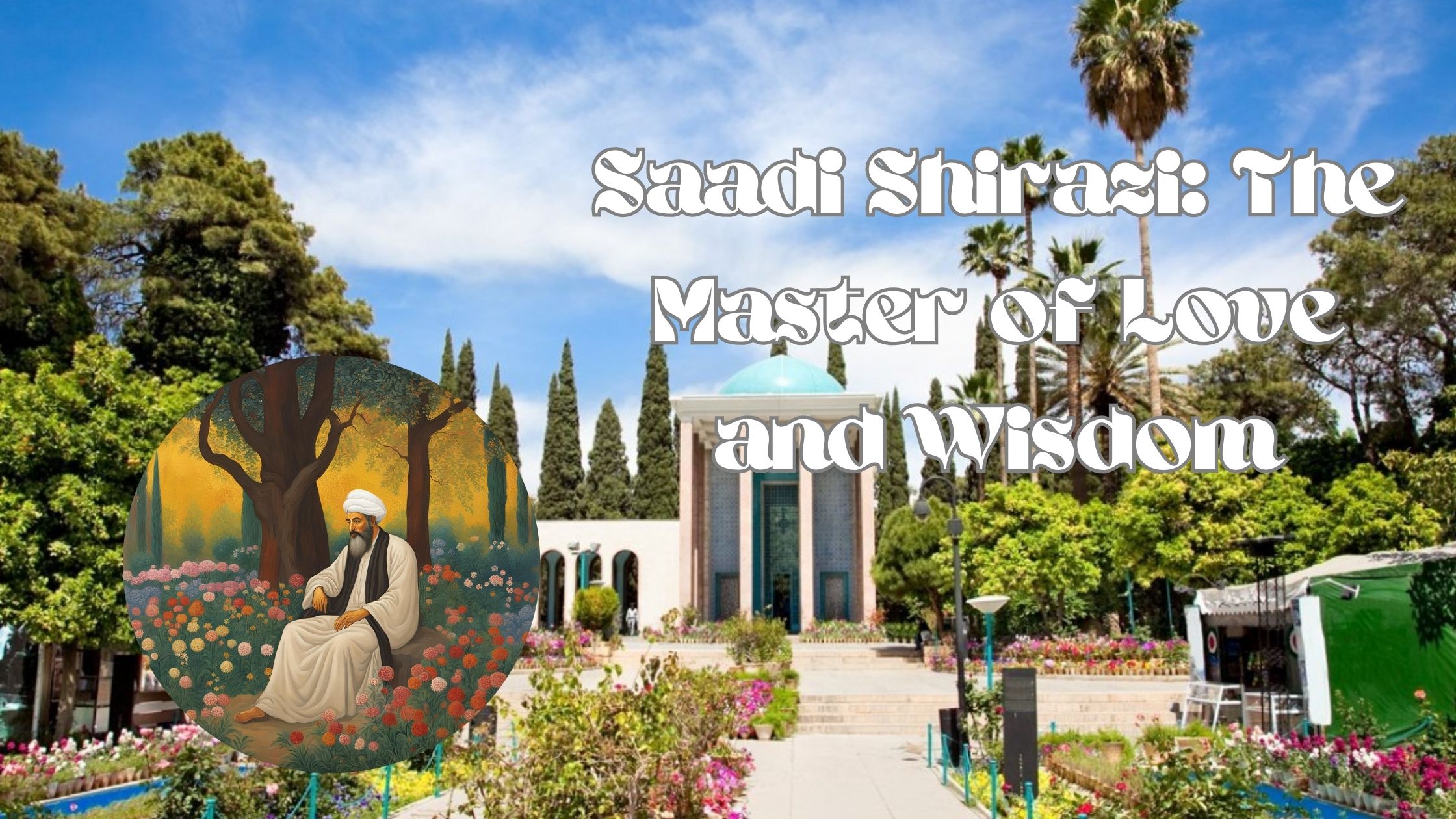Khwaju Kermani, a masterful Persian poet of the 14th century, was renowned for his deeply emotive and spiritually infused poetry. His verses often explore themes of love, longing, and divine beauty, seamlessly blending the human and mystical realms. The poem above is a quintessential example of Khwaju’s lyrical brilliance, brimming with raw passion and unwavering devotion.
Let’s explore the themes, imagery, and enduring relevance of this exquisite piece.
Poem in Persian:
تخفیف کن از دور من این باده که مستم
وز غایت مستی خبرم نیست که هستم
بر بوی سر زلف تو چون عود بر آتش
می سوزم و می سازم و با دست بدستم
در حال که من دانه ی خال تو بدیدم
در دام تو افتادم و از جمله برستم
دیشب دل دیوانه ی بگسسته عنانرا
زنجیر کشان بردم و در زلف تو بستم
با چشم تو گفتم که مکن عربده جوئی
گفت از نظرم دور شو این لحظه که مستم
زان روز که رخسار چو خورشید تو دیدم
چون سنبل هندوی تو خورشید پرستم
آهنگ سفر کردی و برخاست قیامت
آن لحظه که بی قامت خوبت بنشستم
شاید که زمن خلق جهان دست بشویند
گر در غمت از هر دو جهان دست نشستم
هر چند شکستی دل خواجو بدرستی
کان عهد که با زلف تو بستم نشکستم
Translation of Khwaju Kermani’s Poem
Hold back that wine from me, for I am drunk already,
And in the height of intoxication, I know not what I am truly.
Drawn to the fragrance of your dark tresses, like wood on fire,
I burn and endure, shaping myself by my own desire.
When I glimpsed the single mole upon your cheek divine,
I fell into your snare, escaping all else but thine.
Last night, my wild heart, unrestrained and astray,
I dragged in chains and bound to your locks of black-gray.
I told your eyes, “Do not riot and make a scene,”
They replied, “Leave my sight, for I am drunk and serene.”
Since the day I saw your sun-like, radiant face,
I’ve become a sun-worshipper, drawn by your beauty and grace.
You prepared for a journey, and my world turned upside down,
For without your splendid form, I sat in sorrow’s gown.
Perhaps the people of the world may abandon me,
For I’ve abandoned the world in longing for thee.
Though you broke my heart, O Khwaju, it is clear,
The vow I made to your tresses, I’ve kept sincere.
The Drunkenness of Love
Khwaju opens the poem with an admission of his state of intoxication—not from wine, but from the overwhelming presence of the beloved. This metaphor of drunkenness is a hallmark of Persian mystical poetry, where the inebriation symbolizes a transcendence of the self, a surrender to love, and often, a union with the divine.
"Hold back that wine from me, for I am drunk already,
And in the height of intoxication, I know not what I am truly."
This verse reflects a moment of spiritual ecstasy where the poet loses his sense of individuality, consumed entirely by love.
The Fire of Longing
Khwaju likens himself to wood burning on a fire, enduring pain and transformation as he is drawn to the fragrance of the beloved’s hair. The imagery of burning conveys both the suffering and purification inherent in deep love.
"Drawn to the fragrance of your dark tresses, like wood on fire,
I burn and endure, shaping myself by my own desire."
This duality—of pain and creation—underscores the transformative power of love, a recurring theme in Persian poetry.
The Trap of Beauty
The poet narrates how a glimpse of the beloved’s mole, a tiny yet captivating feature, ensnared him completely. In Persian culture, the mole is often a symbol of divine perfection, a small mark that paradoxically reveals the vastness of beauty.
"When I glimpsed the single mole upon your cheek divine,
I fell into your snare, escaping all else but thine."
This moment of surrender speaks to the irresistible pull of love, where the beloved becomes the sole focus of existence.
Binding the Heart to the Beloved
Khwaju vividly describes taming his wild heart and chaining it to the beloved’s locks. This act symbolizes submission and devotion, as the poet willingly binds himself to the object of his adoration.
"Last night, my wild heart, unrestrained and astray,
I dragged in chains and bound to your locks of black-gray."
The heart, often portrayed as rebellious and uncontrollable, finds solace and purpose in its connection to the beloved.
The Sun and Its Worshipper
Khwaju’s adoration of the beloved reaches a spiritual crescendo as he compares the beloved’s face to the sun, declaring himself a worshipper of this radiant beauty.
"Since the day I saw your sun-like, radiant face,
I’ve become a sun-worshipper, drawn by your beauty and grace."
This imagery evokes themes of enlightenment and transcendence, as the beloved becomes a manifestation of divine light.
The Pain of Separation
The poet laments the beloved’s departure, describing it as a personal apocalypse. The absence of the beloved disrupts his world, plunging him into sorrow.
"You prepared for a journey, and my world turned upside down,
For without your splendid form, I sat in sorrow’s gown."
This verse captures the universal anguish of separation, a pain that resonates with anyone who has experienced profound loss.
Unwavering Loyalty
Despite heartbreak, Khwaju remains steadfast in his devotion, emphasizing the enduring nature of true love.
"Though you broke my heart, O Khwaju, it is clear,
The vow I made to your tresses, I’ve kept sincere."
This unwavering loyalty reflects the poet’s commitment to love, even in the face of suffering.
Reflections on Khwaju’s Poetry
Khwaju Kermani’s poetry transcends time and culture, offering insights into the nature of love, longing, and spiritual connection. His ability to weave vivid imagery with profound emotions makes his work deeply relatable, even centuries later.
Key Themes in the Poem
- Love as Transformation: The poet’s journey of burning, binding, and worshipping highlights love’s ability to reshape and elevate the soul.
- The Beloved as Divine: Khwaju’s depiction of the beloved blurs the line between human and divine beauty, inviting readers to see love as a path to spiritual awakening.
- The Pain of Longing: The poet’s lamentation over separation underscores the bittersweet nature of love, where joy and sorrow are intertwined.
Modern Relevance
Khwaju’s exploration of love and devotion offers timeless lessons:
- In Relationships: The poem reminds us of the transformative power of love and the importance of loyalty and commitment.
- In Spirituality: Khwaju’s verses encourage us to seek beauty and divinity in the world around us, finding inspiration in even the smallest details.
- In Art and Expression: The poet’s use of rich imagery and heartfelt emotion serves as a model for creative expression, inspiring us to channel our experiences into art.
Final Thoughts
Khwaju Kermani’s poetry invites us to embrace love in all its forms—romantic, spiritual, and universal. This particular poem is a masterpiece of Persian literature, blending vivid imagery with profound themes to create a work that resonates across generations.
What emotions or memories does this poem stir in you? Share your thoughts and let’s celebrate the beauty of Persian poetry together. Would you like to explore more works by Khwaju Kermani or dive into another Persian poet? Let me know!





